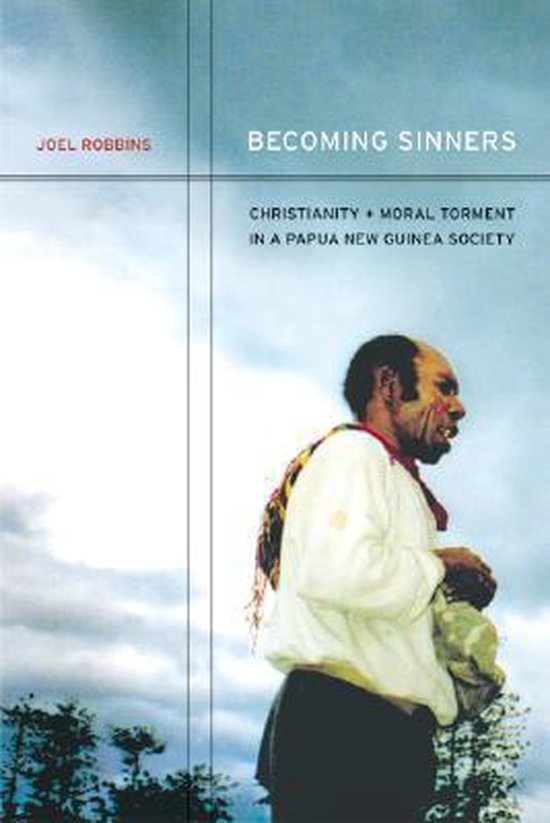
Becoming Sinners
Exploring the Christian culture of the Urapmin, Joel Robbins shows how its preoccupations provide keys to understanding the nature of cultural change more generally. Offers one of the richest available anthropological accounts of Christianity as a lived religion.
"A major contribution to the understanding of cultural change by means of a remarkable ethnographic study of a Melanesian Christianity. Robbins is very unusual among his generation in being able to walk the walk of the most trendy Deep Thinkers without having to talk their talk."—Marshall Sahlins, Charles F. Grey Distinguished Service Professor Emeritus of Anthropology and of Social Sciences, The University of Chicago
"Robbins's excellence as an ethnographer and theoretician is beautifully demonstrated in his book, Becoming Sinners, a ground-breaking ethnography of the interrelations between competing moral discourses in a context of rapid cultural change. One of the most significant contributions of this manuscript is that Robbins has combined a strong humanities orientation in a work on religion and morality with powerful social science methodology. This book will be a major milestone."—Bambi Schieffelin, author of The Give and Take of Everyday Life: Language Socialization of Kaluli Children
In a world of swift and sweeping cultural transformations, few have seen changes as rapid and dramatic as those experienced by the Urapmin of Papua New Guinea in the last four decades. A remote people never directly "missionized," the Urapmin began in the 1960s to send young men to study with Baptist missionaries living among neighboring communities. By the late 1970s, the Urapmin had undergone a charismatic revival, abandoning their traditional religion for a Christianity intensely focused on human sinfulness and driven by a constant sense of millennial expectation. Exploring the Christian culture of the Urapmin, Joel Robbins shows how its preoccupations provide keys to understanding the nature of cultural change more generally. In so doing, he offers one of the richest available anthropological accounts of Christianity as a lived religion. Theoretically ambitious and engagingly written, his book opens a unique perspective on a Melanesian society, religious experience, and the very nature of rapid cultural change.
"A major contribution to the understanding of cultural change by means of a remarkable ethnographic study of a Melanesian Christianity. Robbins is very unusual among his generation in being able to walk the walk of the most trendy Deep Thinkers without having to talk their talk."—Marshall Sahlins, Charles F. Grey Distinguished Service Professor Emeritus of Anthropology and of Social Sciences, The University of Chicago
"Robbins's excellence as an ethnographer and theoretician is beautifully demonstrated in his book, Becoming Sinners, a ground-breaking ethnography of the interrelations between competing moral discourses in a context of rapid cultural change. One of the most significant contributions of this manuscript is that Robbins has combined a strong humanities orientation in a work on religion and morality with powerful social science methodology. This book will be a major milestone."—Bambi Schieffelin, author of The Give and Take of Everyday Life: Language Socialization of Kaluli Children
In a world of swift and sweeping cultural transformations, few have seen changes as rapid and dramatic as those experienced by the Urapmin of Papua New Guinea in the last four decades. A remote people never directly "missionized," the Urapmin began in the 1960s to send young men to study with Baptist missionaries living among neighboring communities. By the late 1970s, the Urapmin had undergone a charismatic revival, abandoning their traditional religion for a Christianity intensely focused on human sinfulness and driven by a constant sense of millennial expectation. Exploring the Christian culture of the Urapmin, Joel Robbins shows how its preoccupations provide keys to understanding the nature of cultural change more generally. In so doing, he offers one of the richest available anthropological accounts of Christianity as a lived religion. Theoretically ambitious and engagingly written, his book opens a unique perspective on a Melanesian society, religious experience, and the very nature of rapid cultural change.
| Auteur | | Joel Robbins |
| Taal | | Engels |
| Type | | Paperback |
| Categorie | | Mens & Maatschappij |